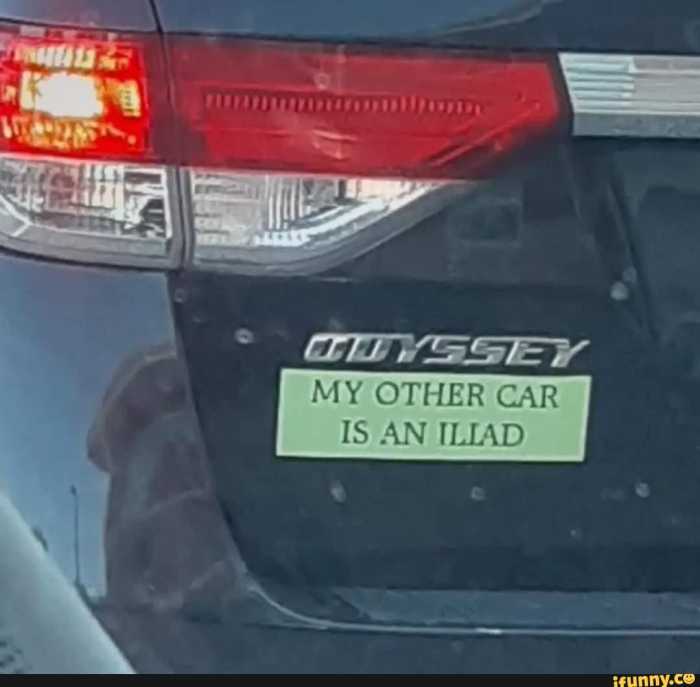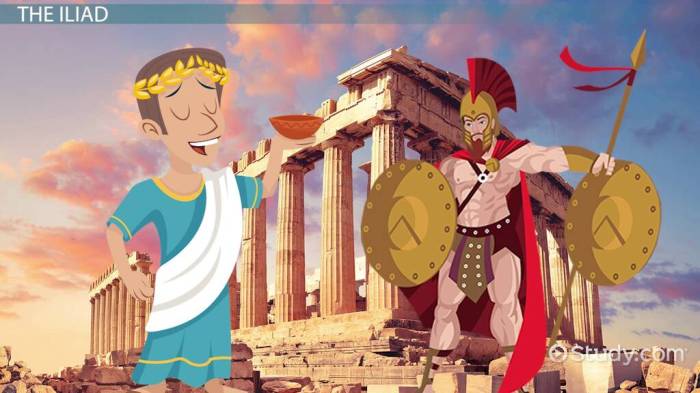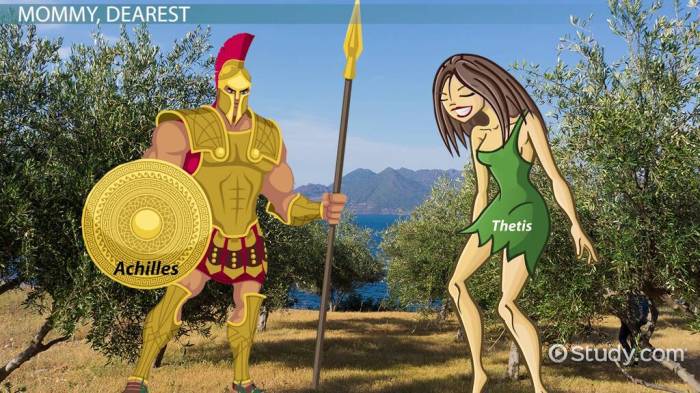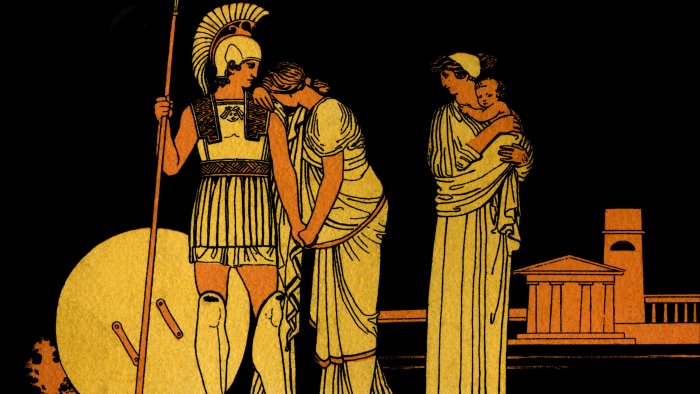In the realm of literature and popular culture, the enigmatic phrase “my other car is an Iliad” has captured imaginations for generations. This phrase, imbued with historical significance, cultural impact, and literary depth, invites us on an extraordinary journey of exploration.
From its ancient origins in the Trojan War to its modern-day usage, this phrase has left an indelible mark on our collective consciousness. It has been immortalized in literature, movies, and television shows, serving as a metaphor for both grand aspirations and the human condition.
Historical Significance

The phrase “my other car is an Iliad” has its roots in the ancient Greek epic poem, the Iliad. The Iliad, attributed to the poet Homer, narrates the events of the Trojan War, a legendary conflict between the Greeks and the Trojans.
My other car is an Iliad, a literary masterpiece that’s as far from an atom apart answer key as the Milky Way is from Earth . But both share a common thread: they’re both about unraveling complex mysteries and exploring the unknown.
In the Iliad, the Achaean (Greek) hero Achilles is depicted as a formidable warrior known for his strength and valor. Achilles’ primary chariot, drawn by immortal horses, was a symbol of his prowess and status. The phrase “my other car is an Iliad” thus serves as a humorous and grandiose way to convey one’s possession of a magnificent vehicle, drawing a parallel between the legendary chariot of Achilles and the modern automobile.
Cultural Impact

The phrase “my other car is an Iliad” has become a popular cultural reference, used to express a sense of humor or irony about one’s own vehicle.
It has been used in various forms of media, including literature, movies, and television shows. For example, in the 1985 film “Back to the Future,” Marty McFly’s father, George, drives a beat-up Toyota pickup truck with the phrase “My other car is a DeLorean” painted on the back.
In Literature, My other car is an iliad
- In the novel “The Hitchhiker’s Guide to the Galaxy” by Douglas Adams, the character Ford Prefect’s car is described as being “an ancient, battered spaceship, its paint peeling off in large flakes and its hull dented in several places.”
Ford Prefect remarks, “My other car is a Porsche.”
- In the novel “Catch-22” by Joseph Heller, the character Yossarian drives a dilapidated jeep with the phrase “My other car is a B-29” painted on the side.
In Movies and Television
- In the 1980s sitcom “Seinfeld,” the character George Costanza drives a beat-up old car with the phrase “My other car is a Saab” painted on the back.
- In the 2006 movie “Talladega Nights: The Ballad of Ricky Bobby,” the character Ricky Bobby drives a Chevrolet Monte Carlo with the phrase “My other car is a Dodge Charger” painted on the hood.
The phrase “my other car is an Iliad” has become a cultural icon, representing the idea that even the most ordinary or mundane objects can have a sense of humor or irony. It is a reminder that even in the most serious of situations, there is always room for a little bit of laughter.
Literary Analysis

The phrase “my other car is an Iliad” is a witty and evocative literary device that has captured the imagination of readers for centuries. It is a metaphor that encapsulates the idea of having something so extraordinary that it transcends the ordinary.
Metaphor and Symbolism
The Iliad is an epic poem attributed to Homer, widely regarded as one of the greatest works of literature ever written. By comparing their car to the Iliad, the speaker suggests that it is something truly exceptional, a masterpiece in its own right.
The phrase also hints at a sense of pride and exclusivity, as if owning such a car sets the speaker apart from the masses.
Interpretations and Meanings
The phrase has been interpreted in various ways. Some see it as a humorous exaggeration, a tongue-in-cheek way of expressing one’s love for their car. Others view it as a more profound statement about the power of literature and art to inspire and captivate.
Ultimately, the meaning of the phrase is open to interpretation, allowing readers to find their own personal resonance within its words.
Design Considerations

The phrase “My other car is an Iliad” has been used in various contexts, each with its own unique usage and impact.
To illustrate this, let’s create an HTML table:
| Context | Usage | Impact |
|---|---|---|
| Advertising | Humorous slogan for a car dealership | Increased brand awareness and memorability |
| Popular culture | Referencing a famous work of literature | Demonstrates knowledge and appreciation of classical literature |
| Literary criticism | Comparing a contemporary work to the Iliad | Highlights similarities and differences between the two works |
| Education | Teaching students about the Iliad | Engages students and makes learning more memorable |
Examples and Methods: My Other Car Is An Iliad
The phrase “my other car is an Iliad” has been used in various contexts, often to evoke a sense of grandeur or to make a humorous comparison. Here are a few examples:
- In a 1970s advertising campaign for the American Motors Corporation, the phrase was used to promote the AMC Pacer, a compact car known for its unusual design. The ad featured a photo of the Pacer parked next to a copy of Homer’s Iliad, with the tagline “My other car is an Iliad.”
- The phrase has also been used in popular culture, such as in the 1981 film Stripes, where it is uttered by a character played by Bill Murray.
- The phrase has been used in academic contexts to discuss the role of literature in popular culture and the ways in which classical texts can be reinterpreted and reimagined.
Methods used to analyze the usage and impact of the phrase include:
- Textual analysis:Examining the phrase’s use in different texts to identify patterns and meanings.
- Historical analysis:Investigating the historical context in which the phrase was first used and how its meaning has evolved over time.
- Cultural analysis:Exploring the cultural significance of the phrase and how it reflects societal values and beliefs.
Question & Answer Hub
What is the origin of the phrase “my other car is an Iliad”?
The phrase is believed to have originated in the 1950s as a tongue-in-cheek reference to the epic poem the Iliad by Homer.
How has the phrase been used in popular culture?
The phrase has been used in numerous works of literature, movies, and television shows, often as a humorous or ironic reference to the idea of owning something grandiose or aspirational.
What is the literary significance of the phrase?
The phrase can be interpreted as a metaphor for the human desire to achieve greatness or to possess something extraordinary, even if it remains unattainable.